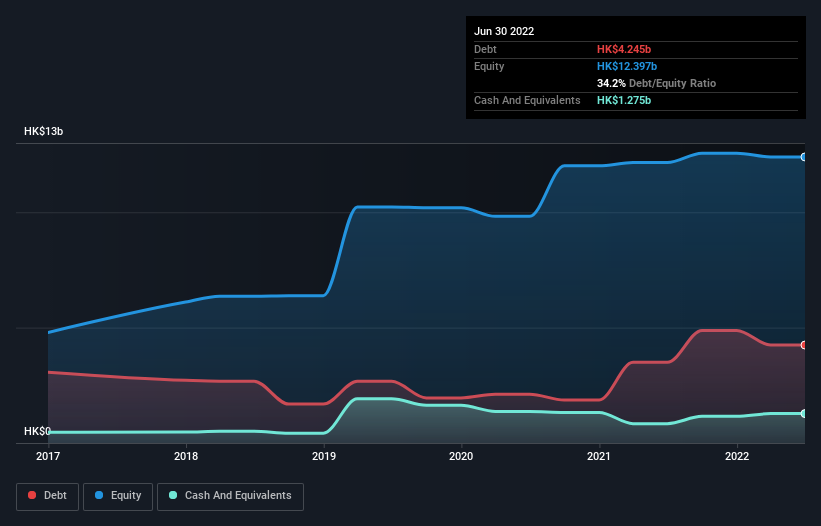Howard Marks put it nicely when he said that, rather than worrying about share price volatility, 'The possibility of permanent loss is the risk I worry about... and every practical investor I know worries about.' It's only natural to consider a company's balance sheet when you examine how risky it is, since debt is often involved when a business collapses. We note that Xinyi Energy Holdings Limited (HKG:3868) does have debt on its balance sheet. But the more important question is: how much risk is that debt creating?
When Is Debt Dangerous?
Generally speaking, debt only becomes a real problem when a company can't easily pay it off, either by raising capital or with its own cash flow. In the worst case scenario, a company can go bankrupt if it cannot pay its creditors. However, a more usual (but still expensive) situation is where a company must dilute shareholders at a cheap share price simply to get debt under control. Having said that, the most common situation is where a company manages its debt reasonably well - and to its own advantage. The first thing to do when considering how much debt a business uses is to look at its cash and debt together.
See our latest analysis for Xinyi Energy Holdings
What Is Xinyi Energy Holdings's Net Debt?
The image below, which you can click on for greater detail, shows that at June 2022 Xinyi Energy Holdings had debt of HK$4.24b, up from HK$3.49b in one year. However, it also had HK$1.28b in cash, and so its net debt is HK$2.97b.

A Look At Xinyi Energy Holdings' Liabilities
Zooming in on the latest balance sheet data, we can see that Xinyi Energy Holdings had liabilities of HK$5.60b due within 12 months and liabilities of HK$2.97b due beyond that. Offsetting these obligations, it had cash of HK$1.28b as well as receivables valued at HK$5.19b due within 12 months. So its liabilities total HK$2.10b more than the combination of its cash and short-term receivables.
Since publicly traded Xinyi Energy Holdings shares are worth a total of HK$17.8b, it seems unlikely that this level of liabilities would be a major threat. But there are sufficient liabilities that we would certainly recommend shareholders continue to monitor the balance sheet, going forward.
In order to size up a company's debt relative to its earnings, we calculate its net debt divided by its earnings before interest, tax, depreciation, and amortization (EBITDA) and its earnings before interest and tax (EBIT) divided by its interest expense (its interest cover). This way, we consider both the absolute quantum of the debt, as well as the interest rates paid on it.
Xinyi Energy Holdings has net debt of just 1.3 times EBITDA, indicating that it is certainly not a reckless borrower. And it boasts interest cover of 9.0 times, which is more than adequate. Also positive, Xinyi Energy Holdings grew its EBIT by 22% in the last year, and that should make it easier to pay down debt, going forward. When analysing debt levels, the balance sheet is the obvious place to start. But ultimately the future profitability of the business will decide if Xinyi Energy Holdings can strengthen its balance sheet over time. So if you're focused on the future you can check out this free report showing analyst profit forecasts.
Finally, a company can only pay off debt with cold hard cash, not accounting profits. So it's worth checking how much of that EBIT is backed by free cash flow. Looking at the most recent three years, Xinyi Energy Holdings recorded free cash flow of 42% of its EBIT, which is weaker than we'd expect. That's not great, when it comes to paying down debt.
Our View
The good news is that Xinyi Energy Holdings's demonstrated ability to grow its EBIT delights us like a fluffy puppy does a toddler. And the good news does not stop there, as its interest cover also supports that impression! When we consider the range of factors above, it looks like Xinyi Energy Holdings is pretty sensible with its use of debt. That means they are taking on a bit more risk, in the hope of boosting shareholder returns. The balance sheet is clearly the area to focus on when you are analysing debt. However, not all investment risk resides within the balance sheet - far from it. Case in point: We've spotted 2 warning signs for Xinyi Energy Holdings you should be aware of, and 1 of them is a bit concerning.
At the end of the day, it's often better to focus on companies that are free from net debt. You can access our special list of such companies (all with a track record of profit growth). It's free.
New: AI Stock Screener & Alerts
Our new AI Stock Screener scans the market every day to uncover opportunities.
• Dividend Powerhouses (3%+ Yield)
• Undervalued Small Caps with Insider Buying
• High growth Tech and AI Companies
Or build your own from over 50 metrics.
Have feedback on this article? Concerned about the content? Get in touch with us directly. Alternatively, email editorial-team (at) simplywallst.com.
This article by Simply Wall St is general in nature. We provide commentary based on historical data and analyst forecasts only using an unbiased methodology and our articles are not intended to be financial advice. It does not constitute a recommendation to buy or sell any stock, and does not take account of your objectives, or your financial situation. We aim to bring you long-term focused analysis driven by fundamental data. Note that our analysis may not factor in the latest price-sensitive company announcements or qualitative material. Simply Wall St has no position in any stocks mentioned.
About SEHK:3868
Xinyi Energy Holdings
An investment holding company, owns, operates, and manages solar farms in the People's Republic of China.
Proven track record and fair value.
Similar Companies
Market Insights
Community Narratives




